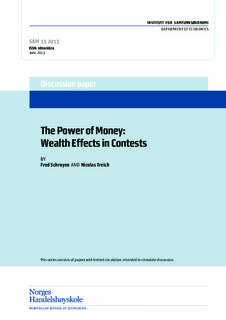| dc.contributor.author | Schroyen, Fred | |
| dc.contributor.author | Treich, Nicolas | |
| dc.date.accessioned | 2014-02-05T12:56:36Z | |
| dc.date.available | 2014-02-05T12:56:36Z | |
| dc.date.issued | 2013-06 | |
| dc.identifier.issn | 0804-6824 | |
| dc.identifier.uri | http://hdl.handle.net/11250/163448 | |
| dc.description.abstract | Two wealth effects typically arise in any contest: i) wealth decreases
the marginal cost of effort, but also ii) decreases the marginal
benefit of winning the contest. In this paper, we introduce three types
of strategic contest models depending on whether the first, second, or
both wealth effects play a role: namely, a privilege contest, an ability
contest, and a rent-seeking contest. Our theoretical analysis reveals
that the effects of wealth and wealth inequality are strongly “contestdependent”
and are complex in the sense that they depend on the
decisiveness of the contest and on the higher-order derivatives of the
utility functions of wealth. Our analysis thus does not support general
claims that the rich should lobby more or that low economic growth
and wealth inequality should lead to additional conflicts. | no_NO |
| dc.language.iso | eng | no_NO |
| dc.publisher | Norwegian School of Economics. Department of Economics | no_NO |
| dc.relation.ispartofseries | Discussion Papers;13/2013 | |
| dc.subject | conflict | no_NO |
| dc.subject | contest | no_NO |
| dc.subject | rent-seeking | no_NO |
| dc.subject | wealth | no_NO |
| dc.subject | risk aversion | no_NO |
| dc.subject | lobbying | no_NO |
| dc.subject | power | no_NO |
| dc.subject | redistribution | no_NO |
| dc.title | The power of money : wealth effects in contests | no_NO |
| dc.type | Working paper | no_NO |
| dc.subject.nsi | VDP::Social science: 200::Economics: 210::Economics: 212 | no_NO |
